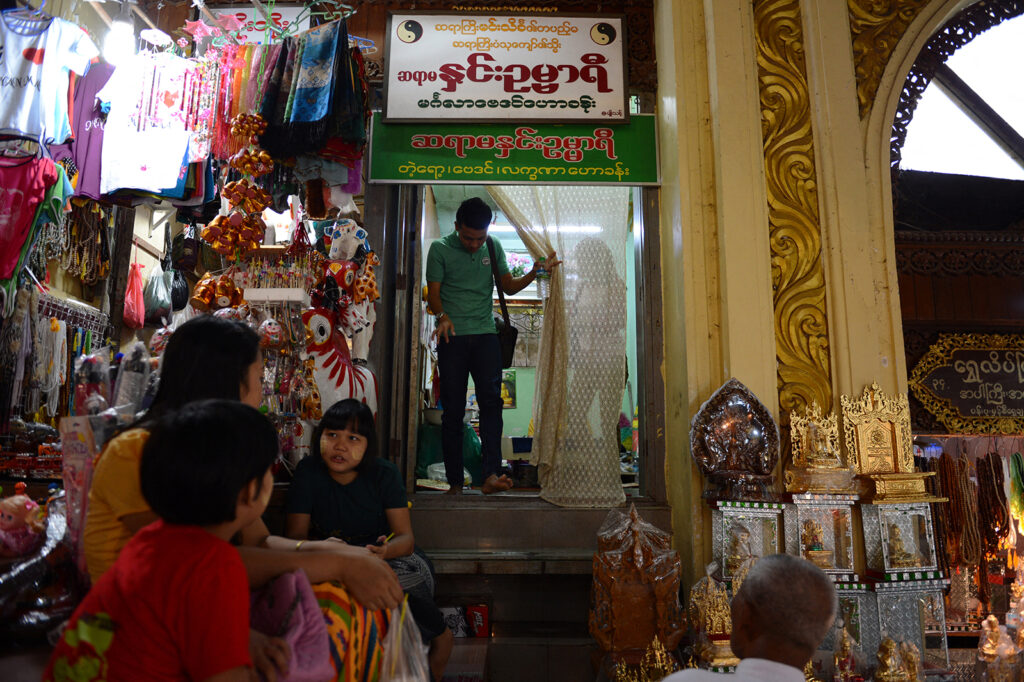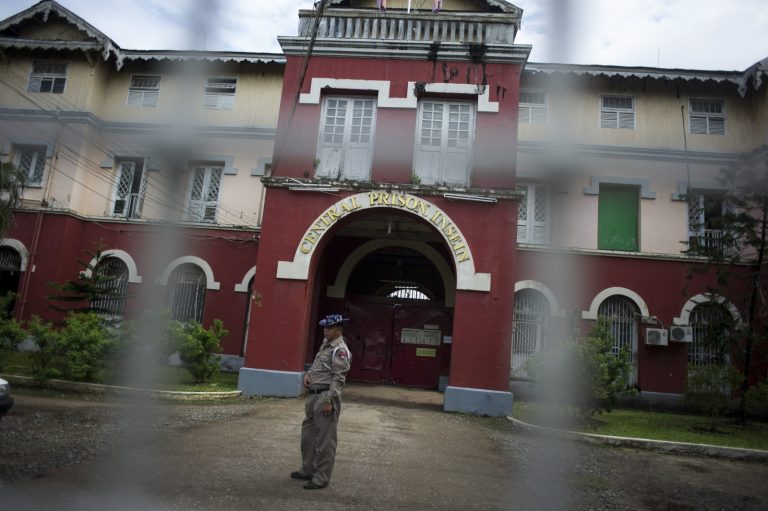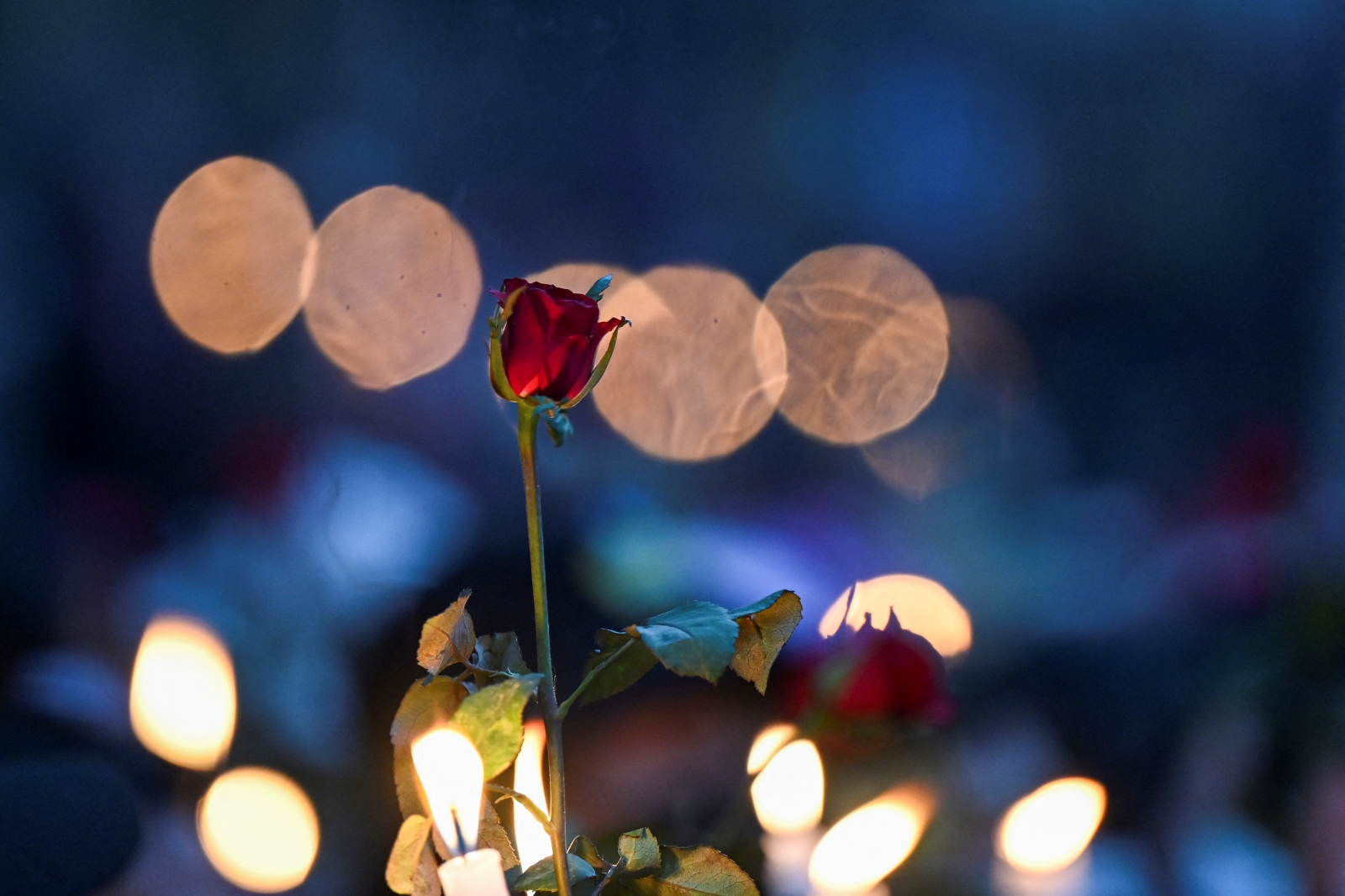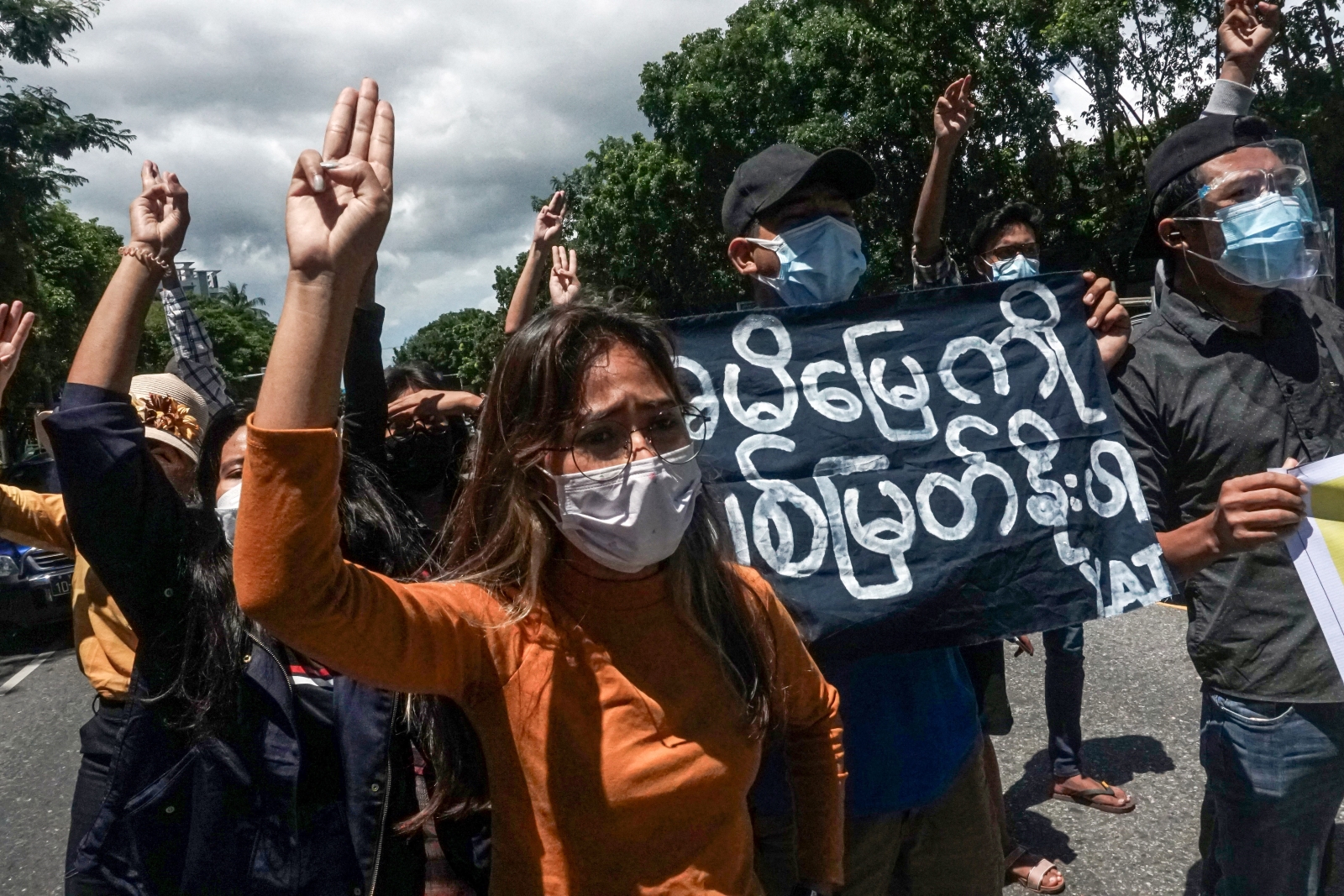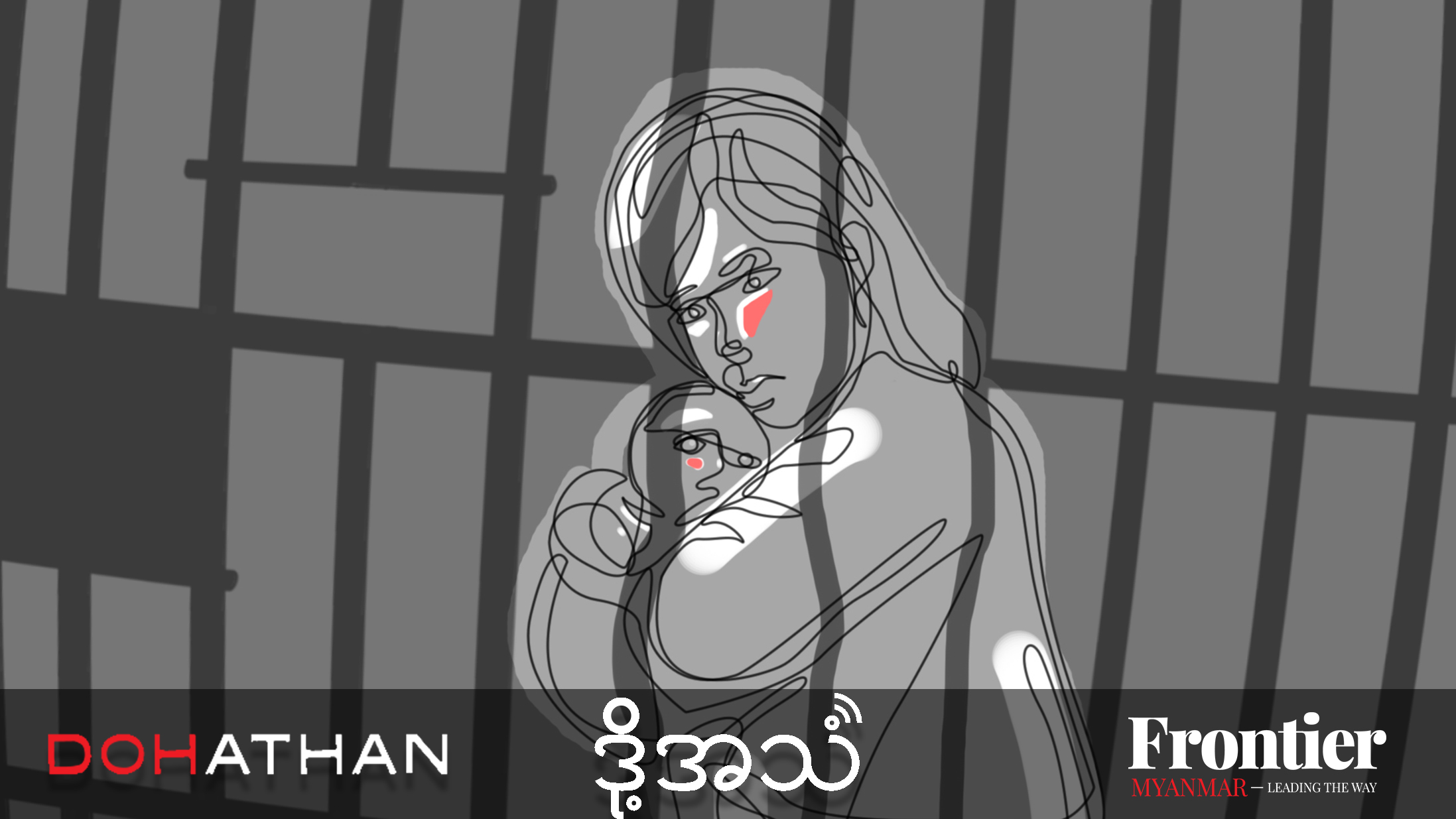With no faith in Myanmar’s broken justice system, some relatives of political prisoners are turning to superstitious practices and fortune tellers – rather than lawyers – in desperate attempts to release their loved ones.
By MOE THAW DAR SWE | FRONTIER
A fair-skinned, thin woman sat crouched in front of an old Karen astrologer, anxiously waiting to hear what he would say while he closed his eyes and muttered to himself.
“I will free your husband from detention within a week. If so, will you donate K1 million [US$473] to me?” he eventually asked her in a shaky voice.
Ma Poe Poe* agreed to his terms and went home to follow his instructions.
She planted seven different flower buds in a sand pot in front of the indoor altar at her home – choosing flower varieties traditionally associated with Monday, the day her husband was born. She was also told to adorn the altar with three religious flags, nine coins and a green and gold cloth, and recite a specific Buddhist mantra every morning. Finally, she was instructed to wear a special bracelet provided by the fortune teller, put her husband’s clothes in a plastic bag in their bedroom and not remove them until he was released.
The rituals are a form of yadaya – occult practices common in Myanmar that are only tangentially related to Buddhism.
Poe Poe’s husband Ko Myint* was arrested by the military regime in April, along with 11 other men in Bago Region. She believes he was targeted because he is a well-known supporter of the National League for Democracy, which won a landslide reelection victory in November 2020, before being overthrown in a coup in February 2021.
But Poe Poe denied the regime’s accusation that her husband was in any way associated with the People’s Defence Forces – anti-junta armed groups that formed in response to military massacres of peaceful protesters.
Consulting an astrologer was not her first choice; it was an act of desperation after failing to secure his release by other means. The day after her husband’s arrest, Poe Poe went to the township General Administration Department office and the police station, spoke to military officers she knew, and even tried paying a bribe.
“When I talked with them, they said that my husband would be sent to the police station and would go to jail because he had committed a crime. I felt hopeless and didn’t know what to do,” she told Frontier.
With nowhere else to turn, she sought refuge in religion and superstition, performing daily rituals and asking advice from no less than five fortune tellers.
“I had to try any method to free my husband,” she said.
Poe Poe said one astrologer looked at her husband’s date of birth, and said he had a bad fortune, would definitely be sent to prison and his life would be ruined. Finally, some friends directed her to the old Karen astrologer, and four days after starting his yadaya plan, Ko Myint was released.
While he had only spent two weeks in detention, like many other prisoners, this period included torture during interrogation sessions.
“They blindfolded me with a cloth and punched me repeatedly,” said Ko Myint, who claimed that two of his ribs were cracked during the beatings. He was subsequently released on bail after being forced to sign a written pledge not to oppose the regime or become involved with PDFs.

A broken judicial system
Since the coup, the regime has arrested thousands of political dissidents, while pliant courts hand down sentences on orders from above. Even lawyers have faced increasing persecution for daring to defend sensitive prisoners from spurious charges. Under such a rigged judicial system, many desperate family members are increasingly turning to the advice of monks and astrologers – rather than lawyers – to secure freedom for their loved ones.
A lawyer, who requested anonymity, said that the ability to provide legal counsel has been severely curtailed in many ways. For example, he said lawyers are now routinely denied access to their clients, who are held incommunicado for months at a time, causing anxiety for family and friends.
He claimed when defence lawyers do manage to access their clients, they must meet with defendants in front of regime officials, including officers from military intelligence, the Special Branch of the police and the Criminal Investigation Department. He said another frustrating development is that if a political prisoner is found guilty in a township court, appeals to district courts are routinely ignored.
“If I’m not satisfied with the judgment because it’s unfair, I can try to appeal, but they will dismiss it quickly. They won’t even allow oral arguments. I write down the appeal and they dismiss it without even reading it,” he said.
So it’s perhaps no surprise that many desperate and despairing families are seeking justice in the occult.
“People ask fortune tellers because they have no idea what else to do,” said 28-year-old astrologer Linn Nhyo Taryar, speaking to Frontier from an undisclosed location. “The only thing left for them to do is put their trust in us.”
Linn Nhyo Taryar was arrested shortly after the coup, and sentenced to two years in prison for defamation, after publicly praying for the military’s downfall and cursing Senior General Min Aung Hlaing on Facebook. He was released in November last year, but said the regime tried to re-arrest him in April, so he fled underground.
The astrologer said it’s common in Myanmar to combine mainstream Buddhist beliefs with traditional superstitions.
“Our people believe in traditional practices very much,” he said. “Most of them seek advice from astrologers.”
Sayadaw Min Thunya, a monk who supports the anti-military movement, said yadaya isn’t true Buddhism, but he understands why desperate people are turning to superstition in the current context.
“These days, you can’t trust lawyers, judges or even monks,” he said.
The State Sangha Maha Nayaka Committee, a government-appointed body that oversees the monkhood, has largely complied with the military regime, leading to a notable dearth of monks in the resistance movement, and possibly further encouraging people to seek advice from astrologers instead.
The military’s relationship with yadaya
Non-Buddhists are also turning to astrologers for guidance.
Ma War*, a 33-year-old Bamar Christian living in Yangon, said she sought advice from an astrologer after her husband was arrested during a business trip to Kayin State in March last year. He was sentenced to two years in prison for defamation and sent to Hpa-an Prison. Ma War asked to withhold additional details of his case for security reasons.
“I was mostly afraid of what could happen during the interrogation,” she said. “Sometimes after an interrogation, they call you and tell you to pick up a dead body the next day. That’s what was always on my mind.”
Over 1,000 people have died in custody since the coup, according to the Assistance Association for Political Prisoners.
About a month after her husband was detained, her Buddhist mother-in-law and other relatives convinced her to see a famous fortune teller in their town to free her husband. Ma War said as a test, she came to the astrologer and only gave her husband’s date of birth, and the astrologer immediately said he had a bad fortune and was in prison.
“The astrologer calculated it and predicted it correctly. We didn’t say anything,” said Ma War.
The astrologer instructed Ma War to undertake a series of tasks to free her husband, including placing fruit offerings, like bananas and coconuts, at particularly significant temples, like the Shwedagon and Botahtaung pagodas in Yangon. She was also ordered to place flowers at her altar at home every day, and release crabs and sparrows.
Caged birds and other animals are a common sight on streets and pagoda compounds in Myanmar. Passersby can pay a small fee to release the animals, believing it will bring them good karma.
In addition to the costs associated with her tasks, she had to pay the astrologer a one-time fee of K20,000.
“My mother-in-law is Buddhist, so she is more familiar with these issues. They do what the astrologer asks,” she said.
Linn Nhyo Taryar said that when he was in prison, many of his fellow inmates asked him to check their fortunes. He was surprised to find most of them were not predestined to be imprisoned, but believes that the military coup has disrupted and perverted the fate of ordinary citizens.
“Their fortunes have been reversed and ruined because of their wicked rulers. In other words, destiny has changed,” Linn Nhyo Taryar said.

He said he believes the military periodically releases political prisoners as a form of yadaya for good karma, much in the same way Ma War releases sparrows and crabs.
“The purpose of the amnesty is to free themselves,” he said.
Military leaders in Myanmar have long harboured an obsession with superstition and yadaya, and current dictator Min Aung Hlaing is no exception. When he appeared on state television after the coup, he was seen wearing a red ribbon on his left hand, a practice that’s believed to help the wearer overcome evil or other challenges. He has also routinely highlighted the birth of a baby white elephant, believed to be an auspicious sign of a great king.
It’s rumoured that Min Aung Hlaing consults with a Shan monk named Vasipake Sayadaw, who has taken a vow of silence. Relatively unknown before the coup, he has since become infamous as an alleged confidante of the senior general.
Last month, resistance group Cobra Column released photos of strange statues supposedly found at a military outpost captured in Kayin State. Some of the figures look like typical Buddhist statues, while others resemble frogs and aliens.
“Being an alien, it’s likely to be a Martian,” Linn Nhyo Taryar wrote on Facebook. “Mars is the red planet of war. In order to give priority to war, the statue of an alien was placed on Mount Lat Khat. Difficult things will become a little easier [for the military] under the guidance of Mars.”
A form of comfort
Meanwhile, the lawyer who requested anonymity said fortune-telling provides people with some relief, but warned it has no bearing on whether prisoners will actually be released – though he said lawyers have no power there either.
“Whether they are right or wrong, at least their worry will be reduced,” he said. “The people who get out of jail don’t escape because of the fortune teller or the lawyer. The family members might not understand this, but the people who were arrested know this for sure.”
Lynn Nhyo Taryar was less dismissive, saying the legal profession and astrologers can work together to help people.
“There have been people who were sentenced to jail, then hired a lawyer and were released. There have also been cases where lost items were recovered after consulting a fortune teller, or even dead bodies,” he said.
But he said in some cases, when legal avenues are closed, fortune tellers play an important role.
“When their sons or daughters are in prison for political cases, people want to ask for help,” he said. “When they can’t do it legally, they only have astrology to rely on.”
Ma War’s husband was released in an amnesty in January, but it came 10 months after she first consulted the astrologer, and after he was passed up for two similar amnesties.
“He wasn’t released in the first or second amnesty, so I don’t think his release was due to the power of yadaya,” she said. “However, doing that provided some relief for me to face each day.”
* indicates the use of a pseudonym for security reasons
Moe Thaw Dar Swe is the pen name of a Myanmar freelance journalist


